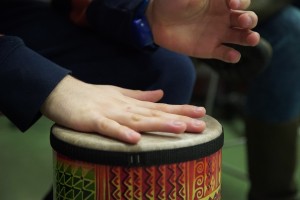On the Beat
For years, drumming has been valued as a tool of personal and community well-being and recently, drumming is gaining in popularity as an intervention for reaching children with autism. As some researchers contend that drumming helps individuals access their right brain (the part which controls emotions, intuition, artistry and relaxation), it is believed that the structure and repetition of drumming appeals to individuals with autism while providing a creative outlet of expression. Additionally, drumming also provides a functional activity that supports language skills such as categorization, sequencing, taking turns, listening, following directions and in turn problem solving.
Through a generous grant received from the Marion Park Lewis Foundation, and under the expertise of Fredrica Dooley-Brown (music therapist) and Jona Masiya (teacher), Grafton’s Winchester campus was able to introduce the Drum Circle Project to our clients. A drum circle is a gathering where individuals come together to express themselves through rhythm and the joy of being together. Krikeli, Michailidis, & Kladianou (2010) note that “Music has the power to adjust and channel collective consciousness of massive groups of people and no one can easily underestimate that music is one of the prominent relaxing and entertaining activities.” The drum circle project is aimed at providing clients within the group homes to engage in individual as well as group drumming activities. Drumming helps us to connect with self and others and group drumming creates a powerful shared sense of community and togetherness. As a result of this project, clients are able to improve socialization, enhance team building, practice meditation and reduce feelings of anxiety and stress. In addition to all these benefits, drumming also has a calming effect as it improves children’s ability to focus and communicate. Clients are learning to appreciate music and instruments of other cultures while having fun.

In addition to helping individuals with autism, music therapy is used with patients who suffered traumatic brain injury and other neurological conditions. Drumming has the potential to reach other parts of the brain that help regulate emotions. Akombo’s (2003) research completed at Shands Hospital at the University of Florida suggested that regular drumming with children suffering from Post-Traumatic Stress Disorder helped reduce pain and fear.
Jona Masiya shares, “For over five years, I have been teaching African drumming to children in their homes. I noticed that most children that I taught have emotional regulation problems. I have also been facilitating inclusive drum circles at Shenandoah Arts Council for six years. Children with disabilities are not included in community events especially drum circles.”
Since the introduction of the drum circle at Grafton’s Winchester campus, what additional lessons have we learned?
• You don’t need any specialized talents to drum. It transcends age, race, nationality and disability.
• Our clients enjoy drum circles. Drumming releases endorphins in the brain that causes feelings of happiness.
• Drumming is meditative, inducing relaxed mental states that reduce anxiety and tension. Clients who demonstrate behavior challenges can be redirected using a drumming activity.
• Drumming is interactive and integrates the emotional, physical and spiritual selves.
• Drumming is another tool that is available to staff within our group homes. Who doesn’t need more tools in their toolbox?
About Marion Park Lewis Foundation
The Marion Park Lewis Foundation for the arts was established in 1992 to award scholarships for Northern Shenandoah Valley students of music, theater, dance, painting, sculpture and creative writing and to provide grants to area organizations. Since its inception, the foundation has awarded more than 2 million dollars in grants. For more information please visit, www.mplf-arts.org.